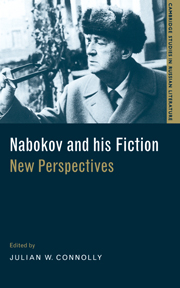Book contents
- Frontmatter
- Contents
- A note on the contributors
- A note on transliteration
- A note on abbreviations
- Acknowledgments
- Introduction: Nabokov at 100
- PART 1 ARTISTIC STRATEGIES AND THEMES
- 1 Setting his myriad faces in his text: Nabokov's authorial presence revisited
- 2 Vladimir Nabokov and the art of autobiography
- 3 The near-tyranny of the author: Pale Fire
- 4 Jewish questions in Nabokov's art and life
- 5 “The dead are good mixers”: Nabokov's versions of individualism
- 6 Nabokov's trinity (On the movement of Nabokov's themes)
- PART 2 LITERARY AND CULTURAL CONTEXTS
- Selected bibliography
- Index
- CAMBRIDGE STUDIES IN RUSSIAN LITERATURE
2 - Vladimir Nabokov and the art of autobiography
Published online by Cambridge University Press: 18 December 2009
- Frontmatter
- Contents
- A note on the contributors
- A note on transliteration
- A note on abbreviations
- Acknowledgments
- Introduction: Nabokov at 100
- PART 1 ARTISTIC STRATEGIES AND THEMES
- 1 Setting his myriad faces in his text: Nabokov's authorial presence revisited
- 2 Vladimir Nabokov and the art of autobiography
- 3 The near-tyranny of the author: Pale Fire
- 4 Jewish questions in Nabokov's art and life
- 5 “The dead are good mixers”: Nabokov's versions of individualism
- 6 Nabokov's trinity (On the movement of Nabokov's themes)
- PART 2 LITERARY AND CULTURAL CONTEXTS
- Selected bibliography
- Index
- CAMBRIDGE STUDIES IN RUSSIAN LITERATURE
Summary
Anyone can create the future but only a wise man can create the past.
Vladimir Nabokov, Bend SinisterBrian Boyd calls Nabokov's Speak, Memory, “the most artistic of all autobiographies,” and it is true that before Nabokov's work the whole notion of the “art of autobiography” could be considered something of a misnomer. But Russian literature, in which Nabokov was so well grounded, thrived on apparent misnomers. Pushkin called his major work in verse, Eugene Onegin, “a novel,” while Gogol proclaimed his long work in prose, Dead Souls, “a poem.” (And Dostoevsky, following in Gogol's footsteps in more senses than one, christened his early prose tale – and the only work of his that Nabokov admired – The Double, “a Petersburg poem.”) Nabokov labeled his work “a memoir” in 1951 and “an autobiography” in 1966, but many critics, noticing the unusually high level of artistry involved, chose to remain unconvinced. “Autobiography as Fiction” was Dabney Stuart's 1978 verdict for Speak, Memory. “Speak, Memory must be regarded as a work of fiction,” G. M. Hyde admonished us in Vladimir Nabokov: America's Russian Novelist.
As innovative as Vladimir Nabokov may have been as a novelist or a translator, nowhere, it seems to me, was the truly original nature of his art revealed more profoundly than in his published autobiographies. Alfred Kazin, who, writing in 1964, was one of the first critics to call Nabokov's Speak, Memory fiction, pointed out that the writer's autobiographical narrative “is designed, even when the author does not say so, to make a fable of his life, to tell a story, to create a pattern of incident, to make a dramatic point.”
- Type
- Chapter
- Information
- Nabokov and his FictionNew Perspectives, pp. 36 - 53Publisher: Cambridge University PressPrint publication year: 1999
- 1
- Cited by



